





|
Green afternoons in the jungle; sad afternoons. A green river flowing through green pastures; green marshes. Afternoons that smell of mud, rain-soaked leaves, of wet ferns and mushrooms. The green, moss-covered sloth little by little climbing from branch to branch, with its eyes closed as if asleep but eating a leaf, stretching out one front claw followed by the other, not bothered at all by the ants biting it, slowly turning its round funny-looking face, first to one side and then the other, finally wrapping its tail around a branch and hanging down heavily like a ball of lead; the shad leaping in the river; the din of monkeys eating ill-manneredly, quick as they can, throwing soursop peels at each other and fighting, chattering, mimicking one another and laughing in the trees; screeching female monkeys carrying pickaback bald babies with lips flared; the elastic long-whiskered agouti that stretches and shrinks up looking all around with its round eyes while it eats, trembling; spiny iguanas like jade dragons shooting over the water (jade arrows!); the black man with his striped shirt, paddling in his ceiba canoe. A girl swinging back and forth in a hammock, with long black hair, and a bare leg hanging out of the hammock, greets us: Adios, California!  The black river, like ink, at dusk. Some flower with a sickening stench like a corpse; and a horrible flower, all hairy. Orchids hanging over stagnant water. Sad whistles in the jungle, and moans. Moans. Sad leaves that fall spinning around. And screeches … A cry among the guanabanas! An ax chopping a log and the echo of the ax. The same screeching! Packs of wild pigs grunting. Outbursts of laughter! The song of a toucan. Rattling of rattlesnakes. Cries of howler monkeys. Chachalacas. The melancholy song of the gongolona among coquito palms, and the song of the dove “go-go-lay, go-go-lay, go-lay, go-lay.” Songful golden orioles swaying in their nests suspended from palm trees, and the song of the lion bird in the cohune palms and the song of the moon-and-sun bird and the bugler bird, the clock bird singing out the hour and the potoo that sings at night (oh poor me) “Poor-me-one” “Poor-me-one” pairs of macaws that pass by squawking, and the güis, chichitote and “feeling-joy” “feeling-joyyyyyyyy” which they sing in among the gloomy bogs. Silvery marshes all aglow, and the frogs singing rrrrrrrrrrrrr And a bird that all night repeats calling its name! The sun setting behind Orosi: Orosi rose-colored, the sky crimson, and the fiery Archipelago of the Solentinames, floating in liquid gold, and the lake then rose-colored, and then opal, and the green palm trees on the islands against the sky, and the sky then grey, and the water grey; and a sad star shines in the evening sky. The oarsmen sing: Ave Maria purisima … and then a silence; just the waves of the lake in the peaceful night. The moon above the lake and the silhouette of dark palms in the moonlight. Just the water beating against our bungo. The island of Ometepe: the water green below the island. In the water a launch leaning with its sails rolled. On the island, clothes of every color spread out on the beach. A cart with its oxen drinking water. A naked boy bathing his horse. And Indians (quite short) carrying firewood. Behind grey huts. Gold-colored coconuts. And up above the green volcano blowing out a lazy puff of smoke into the blue air. 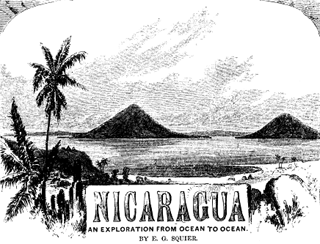 The blue lake. The white heron. And a white sail in the distance. Green islets, with black rocks and icacos, plantain groves, palms, and papayas, and cane huts among the plantain groves. Where the yellow bellflowers of the “gloria de Nicaragua” hanging from trees and trailing over rocks sway above the water. And in that mirror of water upside down, the green islets with their black rocks and their icacos plantain groves, palms, and papayas. A black boat lashed to the shore; in the water a woman with bare breasts and a purple skirt, washing clothes on a white rock, the water up to her knees; and her long straight hair falling freely to the water; and her purple skirt, bare breasts, black hair, black boat, reflected in the water. And far off the silhouette of a boat with two people rounding an island. 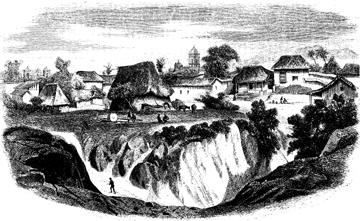 The first night in Granada: Granada under siege; and throughout the night every 2 minutes they shouted Alerta! (And that night I dreamt of storms on the lake. Iguanas walking over Rio Frio and the sailors were singing the Salve and Bernabe Somoza was attacking Granada …) On the tiled roofs of Granada that dazzling verdure: — like a fire burning green. And the first streetlamps pale, in the twilight. A polka on a distant piano. And amid the smell of narcissus a song rises from a courtyard: Delgadina, get up and put on your white dress. And a peal of bells clear and harsh and clear and clear (cling-clang, cling-clang) a harsh iron sound alternating with clear iron sounds: — it’s the tolling of the Angelus! Nindiri! How shall I describe you, Nindiri, beautiful Nindiri! Beneath green vaults: avenues; the smooth avenues of Nindiri. Simple huts made out of cane under the green branches, like nests. Nindiri: the musical name which they gave you when Rome was still young. (Neenda, water; and Diria, mountain) tells us in an ancient, forgotten tongue of the lake and the volcano. Nindiri, beautiful Nindiri: oranges, golden bananas, icaco plums, gold among the leaves. Girls the color of chocolate, their breasts bare, spinning white cotton among the trees. Quiet primitive Nindiri, seat of the ancient caciques and their courts, — vision of the night, some dreamy Arcadia, unreal! How shall I forget you! That small lake in the crater, as if in a goblet, and the women washing clothes in the lake. The lava: like a sea of molten iron, a sea of red rock, treeless, a storm turned to stone, swirls, waves upon waves, knife-sharp. 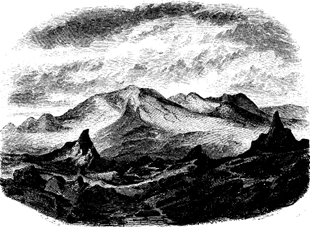 White and light purple hyacinths on the farms; and the flower of the malinche, the sacuanjoche flower, in their curls and braids black as jet. Smiles on lips rouged with annatto. And the girls of Masaya, with their large red earthen jars and pots and their white sleeveless blouses. — Straight as grenadiers under the water jars … And with no more covering than the foam and rose-colored water, splashing water on themselves with gourds, and their hair floating in the water … Mandolins and moonlight on balconies. Marimbas. Marimbas of Monimbo. A lagoon silver-looking in the moonlight! And those dark-skinned women of Nindiri smiling in the doorways of their huts would greet the passing traveler: Adios, Americano! 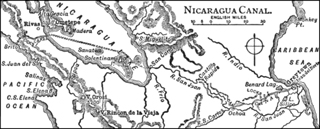 Cloudy grey dawns smelling of milk and fresh manure and dried hay with the lowing of cows and young calves, and a native grackle — the zanate — singing on a cow. Dry huts, smoking, in the dry countryside. Or wet huts, green rain-soaked grass, and white houses with red-tiled roofs drenched under the light blue sky. Pale fireflies around evening time and the sad cicada, cicadas, and the cart and the song of the cart driver. And the zanate singing on a fence. Good-bye, Gentlemen Have a good trip, Sir On the roads there was always a cross with dried flowers … And the tiny light in the brush, and the barking far off. And fires far off in the hills. A bell heard from behind the ceiba trees with a piercing sound: It’s the hour for Vespers and we are near Managua. The girls of Managua toward evening would go singing down to the lake shore to fill their water jars. Silvery sardines were leaping up in the water. 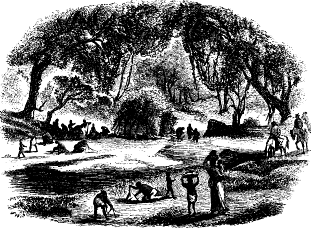 Noon by Lake Managua: The smoke from Momotombo hanging in the sky. A buzzard stopped in the middle of its flight. And the sun shining down without casting a shadow. The two girls of Buena Vista: “The white one” and “the black one.” Buena Vees-ta, Gentlemen! This here farm is called Santa Maria de Buena Vista! These are my little boys and those my big girls! One was white with light hair and blue eyes and the other dark-skinned. The black one is my husband’s daughter and the other one a Frenchman’s! And green parrots in the trees. A cane hut surrounded by palm and plantain trees. Gentlemen, I was young once … And two little heads together sticking out of the doorway; the kids naked, frightened. Good-bye, sweethearts! God preserve you, Gentlemen! “Califooooooornia?”  Even rows of palm trees and at the end of the cane fields a red roof. The blue steam from the mill, the smell of sugar-cane juice, and a hammock swinging back and forth. A monotonous mill about to stop at each turn. In the sun, a cart loaded with firewood, being pulled by two sleepy oxen. Giddyap, giddyap you bastard. On the wall, a rifle, a portrait of Lola Montez, and a tiger skin. And in the air, the flight of a fly like a thread. Buzzards circling in the sky. And the hammock swinging back and forth. And that drowsy milling of sugar cane. Giddyap Canelo. A green cross by a spring-fed pool, decorated with dried wreaths, and a little boy sitting at the foot of the cross. And so I asked him why that cross was there: It’s to recall a horrible crime, he told me. And I learned nothing else about the cross, except that the victim was a woman.  |